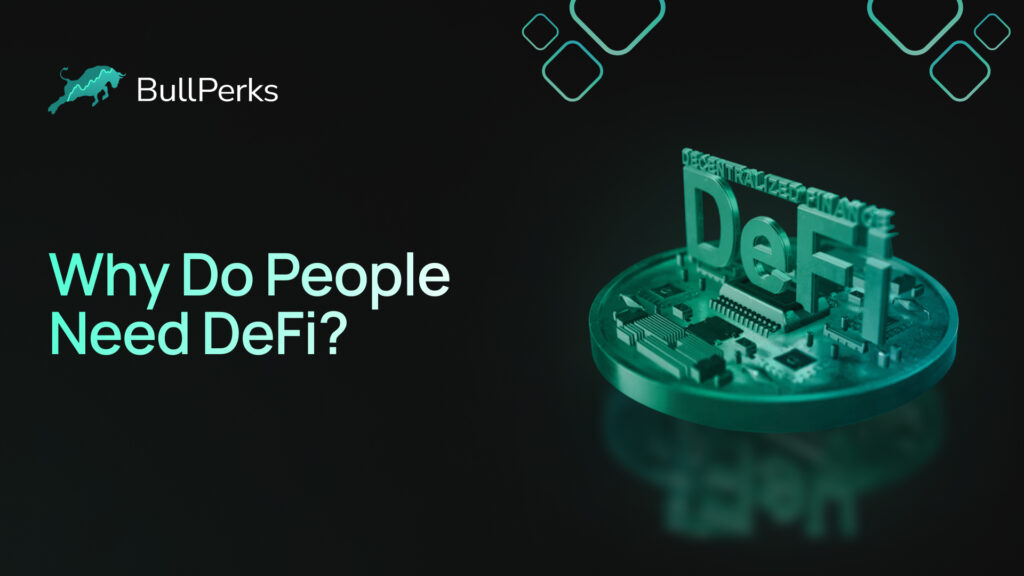
Decentralized Finance, or DeFi, has emerged as a revolutionary force in the financial industry. Unlike traditional finance that relies on centralized authorities and intermediaries, DeFi leverages blockchain technology to create a decentralized ecosystem. This new paradigm enables individuals to have more control and ownership over their financial activities, while also promoting transparency and trust within the system.
One of the key aspects that sets DeFi apart is its ability to enhance financial inclusion. Traditional financial systems often exclude large segments of the population due to high fees, cumbersome processes, and lack of access.
DeFi tackles these challenges head-on by democratizing access to financial services. With just an internet connection, individuals from around the world can participate in a wide range of financial activities, such as lending, borrowing, staking, and yield farming.
This unprecedented level of accessibility has the potential to empower and uplift communities that have historically been underserved by traditional finance.
In addition to increasing accessibility, DeFi also aims to reduce reliance on intermediaries, which can lead to greater efficiency and cost-effectiveness. Traditional financial transactions often involve numerous third parties, such as banks, clearinghouses, and payment processors, each adding their own fees and delays to the process. In contrast, DeFi enables peer-to-peer transactions through smart contracts, eliminating unnecessary intermediaries. This streamlined approach not only reduces costs but also enhances the speed and security of transactions.
Enhancing Financial Inclusion: How DeFi Democratizes Access to Financial Services
With the rise of decentralized finance, the financial landscape is undergoing a significant transformation, particularly in terms of enhancing financial inclusion. DeFi has the potential to democratize access to financial services, breaking down barriers and providing opportunities for individuals who have traditionally been excluded from the traditional banking system.
One of the key ways that DeFi achieves this is through its decentralized nature. Unlike traditional financial systems that rely on intermediaries such as banks, DeFi operates on blockchain technology, eliminating the need for intermediaries and enabling individuals to directly engage in financial transactions. This decentralized approach empowers individuals by giving them more control over their finances and eliminating the potential for discrimination or exclusion that can occur in traditional systems.
In addition to decentralization, DeFi also offers a range of innovative financial products and services that can benefit individuals who may not have access to traditional banking. For example, DeFi platforms provide opportunities for individuals to earn interest on their crypto assets through concepts like yield farming and staking. This allows individuals to make their money work for them, generating passive income and potentially increasing their overall financial well-being.
DeFi enables individuals to borrow and lend funds without the need for a traditional credit check, opening up opportunities for individuals who may not have a credit history or access to collateral.
In conclusion, DeFi is revolutionizing the financial landscape by enhancing financial inclusion. Its decentralized nature and innovative financial products and services are leveling the playing field, providing access to financial services for individuals who have traditionally been excluded. By offering opportunities for individuals to control and leverage their assets, DeFi is truly democratizing access to financial services and empowering individuals to take control of their financial affairs.
Empowering Individuals: The Control and Ownership Provided by DeFi
One of the key aspects that sets decentralized finance apart from traditional financial systems is its ability to empower individuals by providing them with greater control and ownership over their financial transactions. DeFi leverages blockchain technology to enable individuals to directly engage in financial activities without the need for intermediaries.
By utilizing smart contracts and decentralized applications (dApps), individuals can take full control of their funds, execute transactions, and manage their digital assets autonomously and securely. This level of ownership empowers individuals to make their financial decisions without the interference of centralized institutions, fostering a sense of self-reliance and empowerment.
Additionally, since DeFi platforms are built on open and transparent protocols, individuals have greater visibility into their financial activities, enhancing the trust and confidence they have in the system.
Escaping the Traditional System: The Appeal of Decentralization in DeFi
One of the key appeals of DeFi lies in its ability to enable users to escape the constraints and limitations of centralized institutions. By leveraging blockchain technology, DeFi provides a decentralized framework that allows for greater control and ownership of assets. DeFi eliminates the need for these middlemen by utilizing smart contracts on the blockchain.
This means that users can transact directly with one another, cutting out the middlemen and reducing dependency on centralized authorities. The appeal of this decentralization is the freedom it offers individuals to be in charge of their financial activities, without the need for intermediaries' approval or involvement. This shift empowers users to take control of their own finances, making decisions based on their own needs and preferences.
Reducing Intermediaries: The Efficiency and Cost-Effectiveness of DeFi
Decentralized Finance is transforming the traditional financial landscape by offering efficiency and cost-effectiveness through the reduction of intermediaries. In the traditional financial system, transactions often involve multiple intermediaries such as banks, brokers, and clearinghouses. This not only adds complexity to the process but also increases costs and time delays.
With DeFi, transactions can be executed directly between parties or through smart contracts on a blockchain. By eliminating the need for intermediaries, DeFi significantly streamlines processes, reduces the associated costs, and increases overall efficiency.
For example, in a decentralized exchange, users can trade digital assets directly with each other without the involvement of a centralized exchange. This not only reduces fees but also enables faster settlement times. Furthermore, in lending and borrowing platforms, DeFi allows individuals and businesses to access funds without going through traditional financial institutions, thus avoiding lengthy approval processes and associated fees.
The cost-effectiveness of DeFi is particularly beneficial for individuals and businesses in underserved communities who may have limited access to traditional financial services.
By eliminating unnecessary parties, transactions can be executed faster, with lower fees, and without the need for a trusted middleman. This not only improves the overall efficiency of financial transactions but also enhances financial inclusion by providing access to individuals and businesses who are traditionally underserved by the traditional financial system. As DeFi continues to evolve, it is likely to further disrupt the financial industry and pave the way for a more accessible and cost-effective future of finance.
Transparency and Trust: How DeFi Fosters a More Open Financial System
The emergence of decentralized finance (DeFi) has brought forth a new era of transparency and trust in the financial system. Unlike traditional centralized institutions, DeFi relies on blockchain technology to create an open and verifiable ledger of all transactions. This transparency allows users to track and audit every financial interaction, fostering a greater sense of trust among participants.
Global Accessibility: Overcoming Geographical Barriers with DeFi
Decentralized Finance (DeFi) has emerged as a powerful tool for overcoming geographical barriers in the financial world. Traditional financial systems have often excluded individuals in underprivileged or remote regions from accessing essential financial services. However, DeFi is changing this narrative by providing global accessibility to all.
One of the key advantages of DeFi is its decentralized nature, which eliminates the need for intermediaries like banks or financial institutions. This means that individuals from any corner of the world can participate in DeFi applications without the need for a physical presence or local infrastructure. Through the use of blockchain technology, DeFi platforms facilitate financial transactions, such as lending, borrowing, and investing, in a secure and transparent manner. This opens up a world of opportunities for individuals in underserved areas, as they can now access financial services and products that were previously out of reach.
The growth of DeFi has paved the way for a more inclusive and accessible financial system, where geographical barriers are no longer a hindrance. By leveraging the power of blockchain technology, individuals from diverse backgrounds can now participate in global financial markets, gain control and ownership over their assets, and ultimately improve their financial well-being. As DeFi continues to evolve and innovate, it holds the potential to revolutionize the financial landscape, making it more accessible and equitable for everyone, irrespective of their location.
Yield Farming and Staking: Maximizing Returns through DeFi Opportunities
Yield farming and staking have emerged as popular strategies within the decentralized finance (DeFi) ecosystem, offering individuals the opportunity to maximize their returns. These innovative practices allow participants to earn rewards by providing liquidity to various DeFi platforms.
Yield farming involves lending or staking digital assets in decentralized protocols to generate additional income. By depositing their tokens into liquidity pools, investors can earn fees or interest that accrue as other users borrow or trade these assets. The returns obtained through yield farming can be significantly higher than traditional financial instruments, providing an attractive option for those seeking to grow their crypto holdings.
Staking, on the other hand, involves locking up a portion of one's cryptocurrency in a blockchain network to support its operations. By participating in staking, users contribute to the security and efficiency of the network and, in return, receive rewards in the form of additional tokens.
This process not only allows individuals to increase their holdings but also strengthens the overall integrity of the blockchain ecosystem.
Both yield farming and staking present unique opportunities for investors to generate passive income within the DeFi space. However, it is important to note that these strategies come with certain risks, including the potential for impermanent losses and smart contract vulnerabilities. Therefore, individuals should exercise caution and conduct thorough research before engaging in these activities, ensuring they fully understand the associated risks and rewards.
DeFi Lending and Borrowing: Unlocking New Possibilities for Individuals and Businesses
With the rise of decentralized finance (DeFi), lending and borrowing have entered a new realm of possibilities for individuals and businesses alike. DeFi lending and borrowing platforms have revolutionized the traditional lending industry by eliminating intermediaries and allowing users to transact directly with one another. This has not only increased efficiency but also opened up new avenues for access to capital.
One of the key advantages of DeFi lending and borrowing is the removal of third-party intermediaries like banks or financial institutions. Instead, borrowers and lenders can interact directly on blockchain-based platforms, allowing for faster and more streamlined processes.
This not only reduces the complexity and costs associated with traditional lending but also eliminates the need for credit checks or lengthy paperwork. As a result, individuals and businesses, especially those who may have been overlooked or underserved by traditional financial institutions, now have the opportunity to access much-needed funds for various purposes, such as starting a business, expanding operations, or even personal investments.
The Future of Finance: Exploring the Potential Impact and Growth of DeFi
The rise of Decentralized Finance (DeFi) has sparked a revolution in the financial world, opening up new possibilities for individuals and businesses alike. With its decentralized nature and innovative use of blockchain technology, DeFi has the potential to redefine the future of finance.
One of the key impacts of DeFi lies in its ability to democratize access to financial services. Traditional financial systems often exclude large portions of the global population, particularly those in developing countries or with limited financial resources. DeFi, on the other hand, offers an inclusive alternative by removing barriers such as expensive intermediaries or complex regulatory requirements.
Through decentralized platforms, individuals can easily access a wide range of financial services, including lending, borrowing, trading, and earning passive income through yield farming and staking. This democratization of access empowers individuals to take control of their finances and participate in the global economy on their own terms.
The growth potential of DeFi is vast, as it continues to attract attention and investment from both individuals and institutions. As more people realize the benefits of decentralized finance, the adoption and integration of DeFi into the traditional financial system is expected to increase.
This could lead to a more seamless and efficient financial ecosystem, where individuals have greater control and ownership over their assets, transactions are transparent and trustless, and unnecessary intermediaries are minimized.
However, as with any emerging technology, there are challenges and risks that need to be addressed along the way. Regulations, security concerns, and scalability issues are just a few of the factors that will shape the future trajectory of DeFi. Nonetheless, the potential impact and growth of DeFi are undeniable, and it is poised to disrupt and transform the financial landscape in the years to come.
FAQ
What is DeFi and why is it considered the future of finance?
DeFi, short for Decentralized Finance, is a financial system that operates on blockchain technology, eliminating the need for intermediaries like banks. It is considered the future of finance because it offers enhanced financial inclusion, transparency, and control to individuals.
How does DeFi enhance financial inclusion?
DeFi democratizes access to financial services by removing geographical barriers, allowing individuals from all parts of the world to participate in the financial system. This inclusion is particularly beneficial for those without access to traditional banking services.
What benefits does DeFi provide in terms of control and ownership?
DeFi empowers individuals by providing them with full control and ownership of their financial assets. Through smart contracts and decentralized applications (dApps), individuals can transact and manage their funds without the need for intermediaries.
What attracts people towards the decentralization aspect of DeFi?
The appeal of decentralization in DeFi lies in the removal of centralized authorities. By eliminating intermediaries, individuals can escape the control and limitations imposed by traditional financial systems and have greater autonomy over their financial decisions.
How does DeFi reduce intermediaries, and why is it efficient and cost-effective?
DeFi eliminates intermediaries by leveraging blockchain technology, allowing individuals to directly transact with each other. This reduces costs associated with traditional financial services, such as transaction fees, and increases efficiency by eliminating delays caused by intermediaries.
How does DeFi foster a more open financial system through transparency and trust?
DeFi operates on blockchain technology, which provides a transparent and immutable ledger of all transactions. This transparency builds trust among participants, as anyone can verify and audit transactions, ensuring a more open and trustworthy financial system.
How does DeFi overcome geographical barriers and provide global accessibility?
DeFi operates on the internet, allowing individuals from any part of the world to access and participate in the financial system. This global accessibility enables financial opportunities for those who are excluded from traditional banking services.
What are yield farming and staking, and how do they maximize returns through DeFi?
Yield farming and staking are methods used in DeFi to earn passive income by providing liquidity or locking up funds in smart contracts. These activities generate returns in the form of interest or additional tokens, allowing individuals to maximize their earnings through DeFi opportunities.
How does DeFi lending and borrowing unlock new possibilities for individuals and businesses?
DeFi lending and borrowing platforms enable individuals and businesses to access loans or provide loans directly to others without the need for a traditional financial institution. This opens up new possibilities for borrowers to obtain funds and lenders to earn interest on their assets.
What is the potential impact and growth of DeFi in the future of finance?
The potential impact of DeFi in the future of finance is immense. It has the potential to disrupt traditional financial systems, enhance financial inclusion, and provide individuals with more control over their finances. The growth of DeFi is expected to continue as more people recognize its benefits and adopt its decentralized principles.
Would you like to start investing in the most promising crypto projects? Learn how to invest with BullPerks, the fairest and most community-oriented decentralized VC and multichain launchpad!
Disclaimer. This material should not be construed as a basis for making investment decisions or as a recommendation to participate in investment transactions. Trading digital assets may involve significant risks and can result in the loss of invested capital. Therefore, you must ensure that you fully understand the risk involved, consider your level of experience, investment objectives, and seek independent financial advice if necessary.












